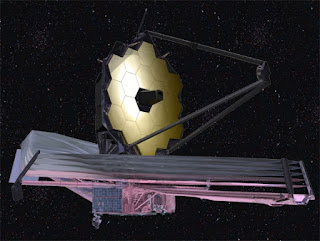The Webb Telescope and Extraterrestrial Life
If you study on it, the insistence of naturalists that life must exist elsewhere in the universe is irrational. They deny evidence for the Creator that is all around them (Rom. 1:18-23), but believe in their invisible friends when no evidence exists.
 |
| Artist conception of the James Webb Space Telescope in action Credit: NASA (usage does not imply endorsement of site contents) |
Over the years, people have tried to determine the possibility of extraterrestrial life out yonder. The moon? No sign of it, not even microbial life in the rocks brought back by astronauts. Venus? Conditions there make life out of the question, despite a hysterical claim that there might be a stinky indication. Mars? Secularists keep trying and coming up empty.
Looking further, exoplanets (extrasolar planets) were found. With better equipment, scientists have been able to determine the sizes and atmospheres of many. They even selected a "Goldilocks Zone" where if a planet orbited a star, the conditions would be just right for life. That's nice, but that habitable zone idea is rather complex.
Our sun behaves so well, you want to pat it on its belly, give it treats, and tell it what a good star it is. Yes it is! Yes it is! Other stars are almost as unstable as my ex-wife but more dangerous. They throw out bursts of radiation, massive flares, getting brighter and then dimmer — they would be killers.
Presuming that the universe evolved as well as life in it, people spend astronomical (heh!) amounts of money. Atheists and others deny that God made Earth special, and the Bible strongly indicates that there is no intelligent life elsewhere. This child believes the search is rooted in rebellion against God.
Don't be disunderstanding me on three things: I like a good science fiction story, am fascinated with interesting research, and realize that people have worked very hard on the Webb telescope, the Hubble, and other research projects. But that sure is a lot of tax money that could be spent on things that have tangible results. Still, Webb gets their spider-senses a-tingling.
High expectations come with the long-awaited James Webb Space Telescope (JWST), 10 billion dollars and 25 years in the making. Set to launch from Earth on 31 October 2021, NASA has dubbed it as the successor to the famous Hubble space telescope.
Hubble launched in 1990 was the first major optical telescope to be put into space. Considered to be one of the greatest scientific projects, it has revolutionised modern astronomy and awed people worldwide with its incredible deep field images.
The JWST primary mission objective is to examine the first light in the Universe (Evolutionist speak for examining the galaxies which are furthest away.) But another aim is to study the properties of exoplanets, specifically to detect and analyse their atmospheres. It is hoped that this will further establish whether a known exoplanet could be habitable to potential alien life.
To read the rest of this extremely interesting article, blast off for "Will the James Webb Space Telescope (JWST) find extra-terrestrial life?" In addition, the short video below is interesting despite the secular propaganda parts: